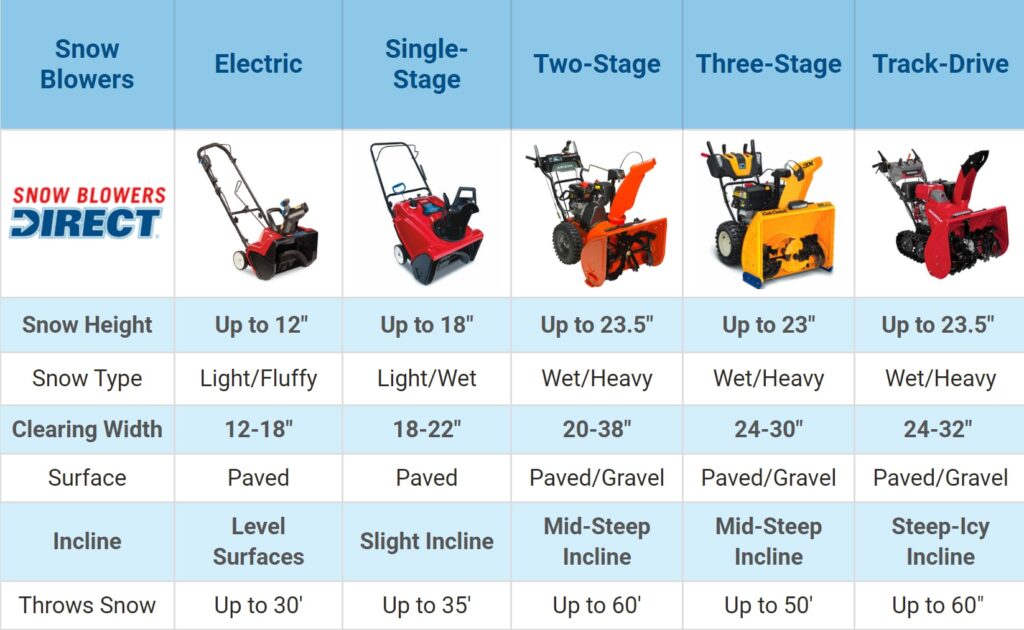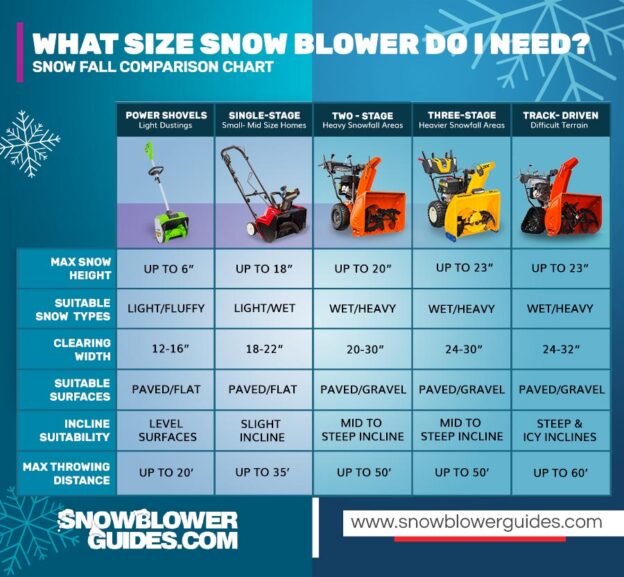If you live in an area that receives heavy snowfall during the winter months, you may find yourself wondering, “What size of snowblower do I need?” It’s a question that many homeowners ask themselves when they’re faced with the daunting task of clearing their driveways and walkways. Luckily, determining the right size of snowblower for your needs doesn’t have to be a complicated process. In this article, we’ll explore the key factors to consider when choosing a snowblower size that will make snow removal a breeze, so you can spend less time shoveling and more time enjoying the winter wonderland.

This image is property of www.snowblowersdirect.com.
Factors to Consider
When it comes to choosing the right snowblower for your needs, there are several factors to consider. The amount of snowfall in your area, the density of the snow, the size of the area you need to clear, the terrain you’ll be working on, your budget, the available storage space, your physical ability, the noise level, the environmental impact, and the maintenance requirements are all important factors to take into account. By understanding and considering each of these factors, you can make an informed decision and choose the snowblower that best fits your needs.
Snowfall Amount
The amount of snowfall in your area is a crucial factor in determining the size of snowblower you need. You’ll want to consider both the average annual snowfall and the peak snowfall. If you live in an area that receives heavy snowfall throughout the winter, you’ll likely need a more powerful snowblower that can handle larger amounts of snow. On the other hand, if you live in an area with lighter snowfall, a smaller snowblower may be sufficient.
Snow Density
Apart from the amount of snowfall, you should also consider the density of the snow. Snow can be light and fluffy or wet and heavy, and this can affect the performance of your snowblower. Light and fluffy snow is easier to move and can be effectively cleared with a smaller snowblower. However, wet and heavy snow requires more power and a larger snowblower to effectively clear it. Keep in mind the typical snow density in your area when choosing the right snowblower.
Area to Clear
The size of the area you need to clear is another important factor to consider. You’ll want to assess the size of your driveway, walkways, sidewalks, or any other areas you need to clear. If you have a small driveway and walkways, a compact and maneuverable snowblower will be sufficient. However, if you have a large parking lot or a vast area to clear, you’ll need a more powerful, wider and more capable snowblower to get the job done efficiently.

This image is property of www.snowblowerguides.com.
Terrain
The terrain in which you’ll be operating your snowblower is another crucial factor to consider. If your property has a flat or gently sloping terrain, you have the advantage of easier maneuverability. In this case, a smaller, more maneuverable snowblower will suffice. However, if your property has steep slopes or uneven terrain, you’ll need a snowblower with enhanced traction and stability to navigate safely. Consider the terrain and choose a snowblower that can handle the specific challenges of your property.
Budget
Your budget is an obvious factor that will influence your decision. Snowblowers come in a range of prices, and it’s important to set a budget that you’re comfortable with. Entry-level snowblowers are typically more affordable and suitable for lighter snowfall and smaller areas. Mid-range snowblowers offer a balance of price and performance and can handle moderate snowfall and larger areas. High-end snowblowers, while more expensive, provide increased power and features for heavy snowfall and extensive areas. Determine your budget and choose a snowblower that offers the best value for your money.

This image is property of www.snowblowersdirect.com.
Storage Space
Consider the available space you have for storing your snowblower when it’s not in use. Snowblowers vary in size, with some models being more compact and others larger and bulkier. If you have limited storage space, a compact and easily foldable snowblower may be the best option. However, if you have ample storage space, you have more flexibility in choosing a snowblower of any size. Additionally, consider the portability of the snowblower if you’ll need to transport it frequently.
Physical Ability
Your physical ability is an important factor in deciding which snowblower is right for you. Consider your strength and endurance when operating a snowblower, as some models can be heavier and more physically demanding compared to others. If you have limited physical strength or endurance, opt for a lighter and more maneuverable snowblower. Conversely, if you have the physical ability to handle a larger and more powerful snowblower, you can choose a model that offers increased capabilities.

This image is property of anestwithayard.com.
Noise Level
If you are concerned about noise levels, it’s important to choose a snowblower that offers quiet operation. Noise can be an issue, especially in residential areas or if you have close neighbors. Look for snowblowers that are specifically designed for quiet operation, as they will have noise-reducing features. While it may not be the most critical factor for everyone, it’s worth considering if noise is a concern for you.
Environmental Impact
As we become more conscious of our impact on the environment, it’s essential to consider the environmental impact of the snowblower you choose. Look for models that are designed to be more fuel-efficient and produce fewer emissions. electric snowblowers are a popular choice for those who wish to reduce their carbon footprint, as they produce zero emissions. Consider the environmental impact and choose a snowblower that aligns with your sustainability goals.

This image is property of anestwithayard.com.
Maintenance
Lastly, consider the maintenance requirements of the snowblower you’re considering. ease of maintenance is an important factor to ensure that your snowblower remains in good working condition for years to come. Look for models that are easy to clean, have convenient access to key components for maintenance, and offer readily available service and replacement parts. Prioritize a snowblower that allows for hassle-free maintenance to maximize its longevity and performance.
In conclusion, choosing the right snowblower involves considering several factors. The amount and density of snowfall, the area to clear, the terrain, your budget, available storage space, your physical ability, noise level, environmental impact, and maintenance requirements are all important considerations. Take the time to think about each factor and how it applies to your specific situation. By carefully evaluating these factors, you can confidently choose a snowblower that meets your needs and helps make winter snow removal a breeze.
